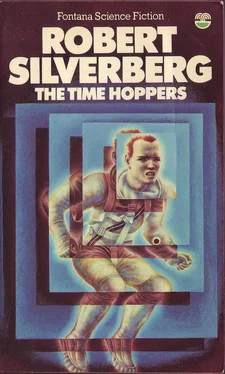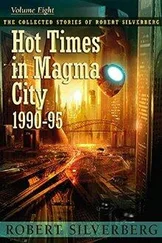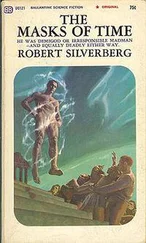Quellen had no intention of inviting the wrath of the High Government by interfering with the departure of Donald Mortensen. But Norm Pomrath was not on the hopper list. Was he covered by Kloofman’s directive, then? Was Quellen required to abstain from any action that could possibly lead to the time-departure of any person whatever?
That made no sense. Therefore Quellen agreed with himself that he could without compromising himself keep watch on his brother-in-law and take steps to prevent Norm from going hopper. That would make Helaine happy. It might also, Quellen thought, contribute to an ultimate solution to this entire worrisome assignment.
“Get me Brogg,” he said into his communicator mouthpiece.
Brogg turned out to be conducting an investigation outside the building. The other UnderSec, Leeward, entered Quellen’s office.
The CrimeSec said, “I’ve got a possible lead. My brother-in-law Norm Pomrath is allegedly on the verge of seeking out a contact who’ll help him become a hopper. I’m not sure there’s any truth in it, but I want it checked. Slap an Ear on Pomrath and have him monitored on a twenty-four-hour, round-the-clock basis. If he utters so much as a syllable about hopping, we’ll make our move.”
“Yes, sir,” said Leeward stolidly.
“There’s also this matter of a certain Lanoy. Did anything new turn up?”
“Not yet, sir.”
“I’ve learned that Pomrath’s supposed contact man is this Lanoy. So that’s our key syllable. Make sure that the monitors are triggered to flash if Pomrath mentions the name. I’m to be summoned immediately.”
Leeward went off to take care of things. There was the end to Norm Pomrath’s privacy, of course. From now until Quellen withdrew the Ear, Pomrath could not embrace his wife, relieve his bowels, scratch his armpit, or denounce the High Government without having some omniscient monitoring system making a record of it. Too bad. Quellen himself had been victimized by an Ear, and he knew the anguish of it, because that was how the treacherous Brogg had learned of the CrimeSec’s illegal home in Africa. Yet Quellen had no real regrets about what he was doing to Pomrath. It was for Helaine’s sake. She had asked to have Norm put in jail, hadn’t she? This would be far less inconvenient to him. He’d never even know, most likely. And he might just lead Quellen to the source of the hopper enterprise. In any event it would be extremely difficult for Pomrath to take leave of the present century while he was being monitored.
Quellen dismissed the Pomrath problem from his mind, for the moment, and turned his attention to other matters of urgency.
The day’s general crime reports had landed on his desk. Obsessed as he was with hoppers, Quellen still had responsibilities in other sectors. He was required to examine the details of all crimes committed within his zone of Appalachia, and to make recommendations for dispensation. The new stack was about the same size as yesterday’s—crime was a statistical constant—and, Quellen knew, today’s atrocities would be neither less nor more imaginative than yesterday’s.
He leafed through the documents.
The roster of crimes no longer chilled Quellen, and that was the worst part of the job. A creeping loss of sensitivity was overtaking him year by year. When he had been young and new at this game, a fledgling Class Eleven just finding out what it was all about, the extent of man’s capacity to do injury to man had numbed him. Now it was all statistics and coded tapes, divorced from reality.
The crimes tended to be motiveless. The benign High Government had removed most of the archaic causes for crime, such as hunger, want, and physical frustration. Everyone received a pay-cheque, whether he worked or not, and there was enough food for all, nutritious if not particularly tasty. No one was driven into banditry to support a starving family. Most addictive drugs were easily available. Sex of all varieties could be had cheaply at government-regulated cubicles. These measures were signs of maturity, so it was said. By making most things legal, the High Government had removed the need to commit illegalities.
True. The motives for crime were largely extinct. Crime itself, though, remained. Quellen had had ample proof of that melancholy sociological fact. Theft, murder, rape—these were amusements now, not matters of need. The middle classes were shot through with criminality. Respectable Class Six burghers did the most hideous things. Plump matrons from Class Five households waylaid strangers in dark alleyways. Bright-eyed children took part in abominations. Even the officers of the law themselves, Quellen knew, circumvented authority by illegal acts, such as establishing second homes for themselves in reservations supposedly limited to Class Two personnel. Yet at least Quellen’s own crime did no direct injury to other human beings. Whereas—
Here was the account of a Class Eight hydroponics man who was accused of a biological crime: unlawful insertion of living matter in the body of another human being. It was alleged that he had anaesthetized a fellow technician, made a surgical opening in his body with an ultrasonic probe, and placed within a lethal quantity of a newly developed Asian carniphage that proceeded to devour the circulatory system of the victim, rampaging up one artery and down the next vein, flowing like flame through the web of vessels. Why? “To see his reactions,” was the explanation. “It was quite instructive.” Here was a Class Six instructor in advanced hermeneutics at a large Appalachian university who had invited a nubile young student to his luxurious two-room apartment and upon her refusal to participate in sexual relations with him did inflict on her a short-circuit of the pain centres, after which he raped her and turned her loose, minus all sensory reactions. Why? “A matter of masculine pride,” he told the arresting officer. “The Latin-American concept of machismo—”
He had his pride. But the girl would never feel sensation again. Neither pain nor pleasure, unless the damage could be undone by surgery.
And here, Quellen saw, was the seamy account of a gathering of believers in the cult of social regurgitation, which had ended in tragedy instead of mystical experience. One of the worshippers, impelled by fathomless motives of cruelty, had covertly intruded three crystals of pseudoliving glass in his cud before turning it over to his companions. The glass, expanding in a congenial environment, had penetrated the internal organs of the victims in a fatal fashion. “It was all a terrible error,” the criminal declared. “My intention was to swallow one of the crystals myself, and so share with them the torment and the ultimate release. Unfortunately—”
The story touched a chord of shock in Quellen. Most of these daily nightmare tales left him unmoved; but it happened that his Judith was a member of this very cult, and Judith had been on his mind since Helaine’s visit. Quellen hadn’t seen Judith or even been in touch with her since his last return from Africa. And it might just as easily have been Judith who swallowed these devilish crystals of pseudoliving glass as the unknown victims listed here. It might even have been me, Quellen thought in distaste. I should call Judith soon. I’ve been ignoring her.
He looked on through the reports.
Not all of the current crimes had been so imaginative. There was the customary quota of bludgeonings, knifings, laserings, and other conventional assaults. But the scope for criminality was infinitely great, and fanciful atrocities were the hallmark of the era. Quellen turned page after page, jotting down his observations and recommendations. Then he pushed all the troublesome material aside.
He had not yet had a chance to look at the spool that Brogg had labelled Exhibit B in the hopper investigation. Brogg had said that it represented some tangential evidence of time-travel outside the recorded 1979-2106 zone. Quellen put the spool on and settled back to watch.
Читать дальше












